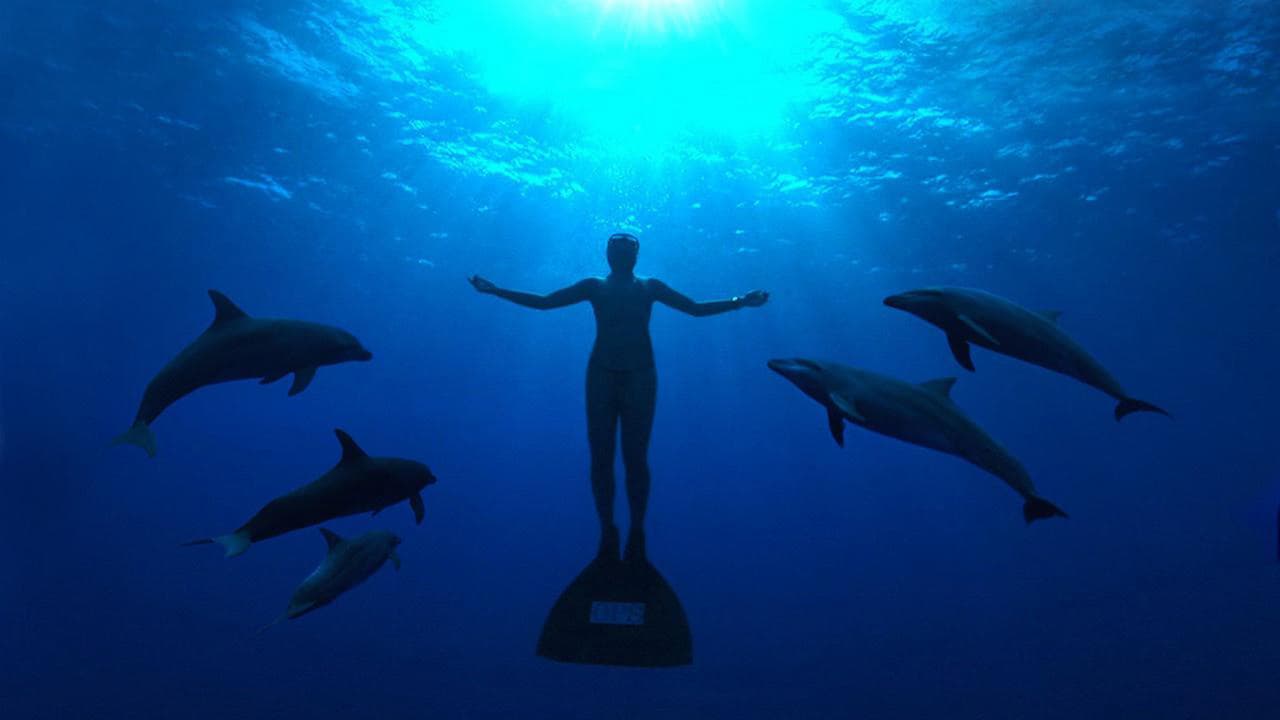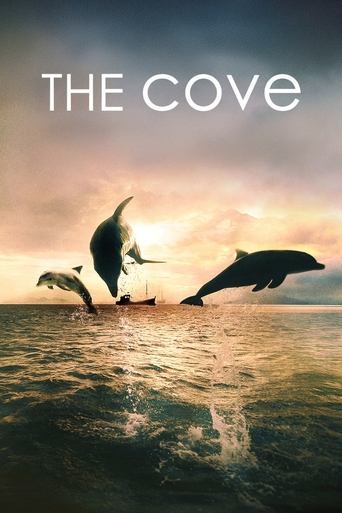



Am I Missing Something?
A film of deceptively outspoken contemporary relevance, this is cinema at its most alert, alarming and alive.
View MoreExactly the movie you think it is, but not the movie you want it to be.
View MoreI think this is a new genre that they're all sort of working their way through it and haven't got all the kinks worked out yet but it's a genre that works for me.
View MoreRic O'Barry shows Louie Psihoyos and the Oceanic Preservation Society the dolphin slaughter happening in Taiji, Japan. At first, he seems like a paranoid nut but just because he's paranoid doesn't make it untrue. He's followed and harassed by the fishermen and local police. Ric was the original trainer of dolphins starting with five dolphins on the TV show Flipper. It led to a world-wide trade of live dolphins in shows like in Sea World. After one of his beloved dolphins committed suicide, he goes on the long road to end the industry that he invented. The movie shows the international gamesmanship by the Japanese at the International Whaling Commission, the toxic levels of mercury in dolphin meat, and the difficulty of spreading the word especially in Japan. The OPS with help tries to surreptitiously film the slaughter in the hidden cove. This is an eye opening documentary. It's quite effective as a movie. As for its results, this is more of a step more than a revolution. Another film Blackfish is able to make bigger and more effective change. Trying to change Japan continues to run into a brick wall.
View MoreThe landscape of Taiji was beautiful. Video images were beautiful, too. The red sea imbrued with blood, however, gave me a very strong impression as contrasted with the beautiful scenes. That was probably the intention of the producer. The essence of the problem is emotions. Seeing the bloody cove, I still don't think killing dolphins for life should be banned. Dolphins don't die in vain but were eaten by human beings. People will certainly keep living without eating dolphins, but it may be good to have dolphins as our option for cooking ingredients. Is this a luxury and brutal wish? Mercury pollution is certainly a problem. It is probably easier to control mercury pollution for creatures in land than ones in sea under the current situation. In this sense, reducing amount of ingestion of aquatic food will be good for health in long term. This is, however, a problem of ocean pollution and totally a different subject from whether or not you eat dolphins. Against the question why you eat whales, from the beginning, I am trapped by an emotion and can't get away from it. "Why don't you feel mercy for cows but whales?" No one has answered this question. Neither this movie. I imagine very poor visual scenes when cows are slaughtered for meat. I didn't want to see the slaughtering scenes.
View MoreThis documentary was extremely powerful. Although they may have broken Japanese laws, the people behind this film will continue to create changes in global fishing policy. It amazes me how many people have been affected by the corruption of Japanese fishing activity, and the fact that so many dolphins are murdered each year for almost no reason is disgusting and astonishing. Not only is dolphin meat not nutritional nor tasteful in Japanese culture, but the chemical problems associated with it are extremely impactful as well. All in all, this film was very well done and stands for a good message. I have massive respect for the people behind this movement and I hope they continue to enact change in the future.
View MoreThe Cove is a call to action movie about Japan's dolphin fishing culture asking for a halt to mass dolphin murdering use for food. The film tries to show light of Japanese brutal fishing practices, and to inform and educate the public about the risks, and increasing hazard, of mercury poisoning from dolphin meat. The movie produces by Americans fail to do one thing: get the Japanese people involve! The movie is full of Japanese bashing, and there is little room to bring them onboard. The film wasn't even for a Japanese audience, but western culture! If there is something that is view to be wrong in Japan, wouldn't you at less, try to bring in the Japanese people into the cause?? The film seem to be a what western deem wrong of eastern cultures without giving proper notice on why they kill dolphins. The film just kinda hint at it, but the reason why people in Japan have eaten dolphins and whales is because such sea mammals have been source of protein easily-available due to the lack of Japan landmass. Japanse people go out to the sea to secure source of protein. The film likes to show the affect of mercury poisoning, but majority of Japanese people are pretty healthy compare to United States high obesity levels. While eating dolphin is a Taiji fisherman tradition, it's no different between regional variations in custom, language or diet in US where people eat alligators, horses, and deer game. Fishes here have high mercury levels here too, plus TNT. I believe this documentary should have been made by the Japanese people like how 'Food Inc' ( anti-food companies documentary) was made in the US to show, how nation like US giving priority to special interests over citizens' health, buying votes at international organizations like the UN, using state powers to cover-up embarrassing issues, and have irrational policies in it's farming and ranching ways. All similar to the issues address in this documentary about Japanese fishing. Rather than Japanese bashing Japanese fishing, it's Western culture bashing how they eat. How would it be like if Hinduism film US slaughterhouse? The Japanese people are made out to look bad, and negative light in this film. The film is told through an ocean conservationist's point of view, Ric O'Barry whom in the 1960's help capture and train dolphins for the role of 'Flipper'. He became activist when his lead Flipper, 'Cathy' in his mind commit suicide by shutting off her blow hole voluntarily in order to suffocate for reasons due to her captivity. Is there any hard evidence of dolphin suicide? No. Tantalizing information that yet have proved to be a fact. He spent the world, helping dolphins. Ric O'Barry and a A-Team of Mission Impossible film activists come to bizarro land where the town people adoration dolphins to uncover the truth. Why because Ric O' Barry has it against the Japaneses, he like mocking them in some scenes, because for the Taiji's Cove is the Auschwitz for dolphins. Taiji kills dolphins with spears in unnecessary and cruel ways. Yes, that's truly sad. The film states that the dolphin hunt is, in large part, motivated by the tremendous revenue generated for the town by selling some of the captured dolphins to aquariums and marine parks. The dolphins that are not sold into captivity are then slaughtered in the cove and the meat is sold in supermarkets. It's sounds like the Japanese isn't the one in fault here. Are we evil cause we love Flippers as a child? I guess-- Flipper and every dolphin fans are, since the show fueled widespread public adoration of dolphins, influencing the development of marine parks that included dolphins in their attractions. While the film loves to talk about how bad it is to keep dolphins in captivity. Some marine parks, like Sea World, are nothing short of essential. Their main function is conservation. Without captive breeding, many endangered species would now be extinct. To say that, all dolphins shouldn't be in captivity isn't true. I saw the bashing of Sea World, really unfair. It's really sad that dolphins get kill in Taiji, but indeed it's well-told issue that need to come into light, and I for one appreciate the risks taken by the film makers in attempting to get this story out. It work and dolphins/whales hunting has decrease since 2009, but the overused of Japan when Norway and Denmark kills as much as Japan is chilling to the point that the documentary might be a propaganda film against eastern cultures full of conspiracy theorists and nation character assassination for the gullible. The producers did little to fight for more screening in Japan when it came out and cause if it was going to be solve, it should come from the Japanese people, not international heat. It's a shame. Hypocrisy is full in this film.
View More